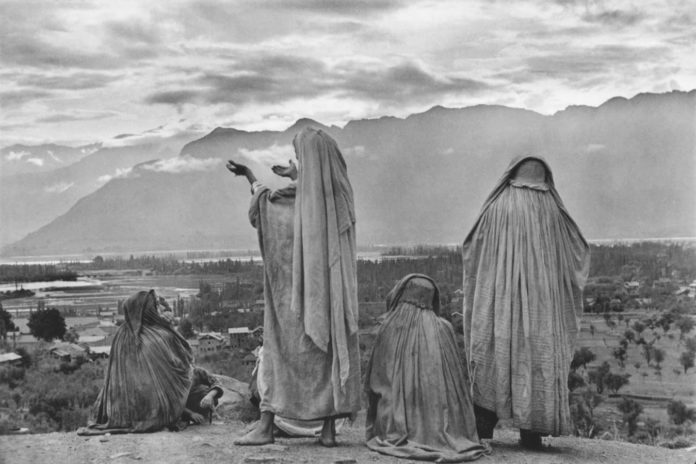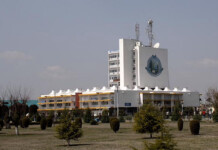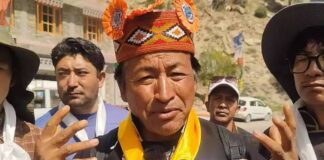In ‘Peer-i-Vaer’ called Kashmir, Sufi women and their spiritual prowess have largely stayed as unsung legends.
Kashmir is the only region in the sub-continent which has a deep-rooted mediation about the spirituality of women. The elevation of Lal Ded to ‘Maryarn-i Makani’, ‘Rabi’a Thani’, ‘Arifa’ and so on in the Persian hagiographical literature explodes the myth about the lower status of women in Islam.
Furthermore, most women Sufis of the Valley were converts to Islam. Their glorification in the Persian sources, in fact, points to the estimation in which they were held by the folk.
Unlike Bibi Jamal and Jahan Ara Begum—the only known female Sufis during the Mughal period—the Kashmiri woman Sufis were able to develop close contacts with the commoners. It would, therefore, be worthwhile to give a brief sketch of their role in the history of Islam in Kashmir.
Behat Bibi and Dehat Bibi
The hagiographers give conflicting accounts regarding the enrolment of the two Hindu sisters, Behat Bibi and Dehat Bibi, in the Rishi silsila. Whatever be the truth, it is certain that both of them were disciples of Shaikh Nuruddin. That’s why they are popularly known as Chhat Kori, i.e., daughters trained under the spiritual care of Shaikh Nuruddin.
One might doubt the ability of Behat Bibi and Dehat Bibi to converse with a Sufi like Mir Sayyid Muhammad Hamadani (RA) in the Persian language. However, strong documentary evidence as also the tomb of the two Sufi women at Zalsu—the place which to this day commemorates the historic meeting between Shaikh Nuruddin and the Sayyids—support the ability of the disciples of Nuruddin to communicate with the leader of the Sayyids. Besides, both sisters were daughters of a patwari who also embraced Islam at the hands of Nuruddin.
Being daughters of a Persian knowing father, it is most likely that both sisters were familiar with the language which had begun to be popular among the Kashmiris. It is possible that Mir Sayyid Muhammad Hamadani (RA) himself, as a conscious missionary, was able to understand the Kashmiri language during his long stay in the Valley extending from 796/1393, to the meeting between the Sayyid and the Shaikh in the later part of the Sayyid’s long stay in the Valley.
By that time, the Sayyid must have also been able to speak broken Kashmiri. The sayings attributed to Behat Bibi and Dehat Bibi reveal their intuitive grasp. Their deep mystical truths were schooled under the care of Nuruddin (RA). Some of these sayings are worthy of note here.

Sayings of Behat Bibi
To imagine that every human action reaches its ultimate end due to the efforts of the self is the greatest shirk.
One who destroys one’s ego is relieved of the sorrows of one’s existence.
Salvation from hope and far lies in annihilating the self.
Dialogue between Sayyid Muhammad Hamadani (RA) and Dehat Bibi
After Sayyid Muhammad Hamadani (RA) posed a question to the Shaikh, Dehat Bibi began to argue with the distinguished guest.
Sayyid Muhammad Hamadani: Why have you weakened the horse [pointing at him]?
Shaikh Nuruddin: Being an inexperienced rider, I cannot afford to give rich food to the horse. If he is not kept under control, he may become unruly and cause me trouble [while reaching the goal].
As a close disciple of Nuruddin, Dehat Bibi was profoundly aware of the spiritual attainments of her preceptor. Perhaps, sensing that humility of the Shaikh might not create a favorable impression upon some conceited companions of Sayyid Muhammad Hamadani, she intervened.
Dehat Bibi: Those who have [already] reached the goal do not need either conveyance [horse] or a whip.
Sayyid Muhammad Hamadani: Who have attained the goal?
Dehat Bibi: Those who have liberated themselves from [the snares of] the self.
Sayyid Muhammad Hamadani: Have you freed yourself from the self?
Dehat Bibi: But for annihilating myself, I would not have dared sit in this solemn meeting and shared secrets [with you].
Sayyid Muhammad Hamadani: Are you a daughter or a son?
Dehat Bibi: If I am non-existent [newest], then I am neither a girl nor a boy; but if I am existent [hast] then I am nothing.
Sayyid Muhammad Hamadani: How have you gained this?
Dehat Bibi: After having attained salvation from the death of the spirit.
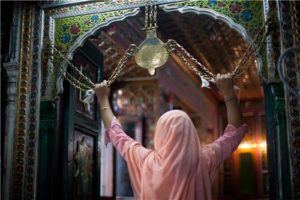
Shanga Bibi alias Yawan Maech
Shanga Bibi was a courtesan of enticing beauty who was apparently asked by some Brahmans of the city to seduce the Shaikh. The Shaikh admonished the alluring courtesan so convincingly that she felt ashamed and after offering ‘tauba’ gained entry in the Rishi order.
By virtue of her devotion and austerities, Shanga Bibi was even granted the unique privilege of acting as a mujawir at her spiritual preceptor’s tomb.
That a courtesan, after clothing herself with the robe of faith and humble repentance, could be elevated to sainthood bears elaborate testimony to the egalitarian appeal that Islam had for the commoners in the Valley.
Shanga Bibi lies buried near the tomb of Shaikh Nuruddin at Chrari Shariff.
Deta Bibi
Nothing is known about Deta Bibi beyond the fact that she was a devoted disciple of Nuruddin. Her burial place is at Mukhta PhoLri near Naushahr in Srinagar.
Sala Bibi-I and Sala Bibi-II
Both women received the guidance of the Shaikh. Because of their devotion, meditation and asceticism, the hagiographers call them Gnostics. Their graves are at Chrar-i Shariff near the Shaikh’s tomb.
Sham Ded
During Shaikh’s conversations with peasant girls during his sojourn at Hunchipura in the pargana of Beerwa, the girl who was prompt in responding to the Shaikh’s taunts was Sham Ded.
Later, so distressed would be Sham Ded at the death of Nuruddin, that she composed an elegy as a token of her intense love for, and deep devotion to her spiritual preceptor.
The elegy is the first of its kind in the history of Kashmiri literature, and indeed, the credit for composing such a unique literary piece goes to the female disciple of Shaikh Nuruddin.
Sham Ded, like most Rishis, subsisted on wild vegetables from the forest. After the death of Nuruddin she travelled in every nook and corner of the Valley in the manner of her preceptor. She finally settled in Poshkar near the habitat of Baba Latifuddin, whom she served for a considerable time.
It seems that during her travels Sham Ded popularized the mystical poetry of Nuruddin among the folk. Perhaps this is the reason why some old Kashmiri women still carry on the tradition of preserving the heritage of Nuruddin and Sham Ded by committing to memory mystical verses and precepts of both the teacher and the taught.
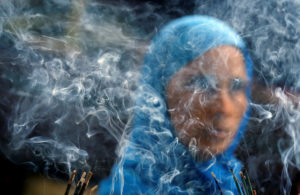
Some of the sayings of Sham Ded are:
The teacher is the fountain-head of nectar. One who drinks deep at this fountain will never die.
Divulging the secrets of God is worse than shedding the blood of a thousand innocent men.
In this world the status of man is higher (than woman); but in malakut the status is dependent on courage. And a man characterized by cowardice is worse than a woman. But (indeed) a courageous woman is better than a man.
In (seeking) union with God, I was intoxicated (unmindful of my own puny existence); but while recognizing my own self I was saturated with the knowledge of His Presence.
Sanga Bibi
She was a seeker of truth from her childhood, but she earned reputation as a Sufi only after her initiation in the Rishi order at the hands of Baba Shukruddin. Although her ancestral home was in the pugana of Hamsrl, she secluded herself on the top of a mountain in the village Buthu of Kuihama at the command of her spiritual preceptor.
She observed continual fasts and spent sleepless nights in deep meditation. Even as an ascetic, however, she did not lose touch with society. Her disciples were many and whatever was offered by them in name was expended to the poor.
Her khalifa, Baba Ncki Rishi, proved to be a true disciple of the noble lady by his philanthropic activities. He even distributed the domestic animals, belonging to the fraternity of the Rishis, among the needy and the poor.
Ganga Bibi
Ganga Bibi became a Rishi after her husband, Lanker Mal, joined the silsila of Rishis under the influence of Baba Luda Mal. The Bibi observed continued fasts and in spite of her austerities, did not shirk from hard manual work.
Whatever little she earned by the sweat of her brow, she donated for making bridges and mosques. When Baba Lanker MaL secluded himself in the forest of Dandakvan, Ganga Bibi proved her mettle as a devoted wife.
She would bring her husband water for his ablutions. And it is said that whenever she came across wild animals while carrying water they would take to their heels on seeing her!
(The story has been compiled based on the details in the book “Kashmir’s Transition to Islam” by Mohammad Ishaq Khan)


